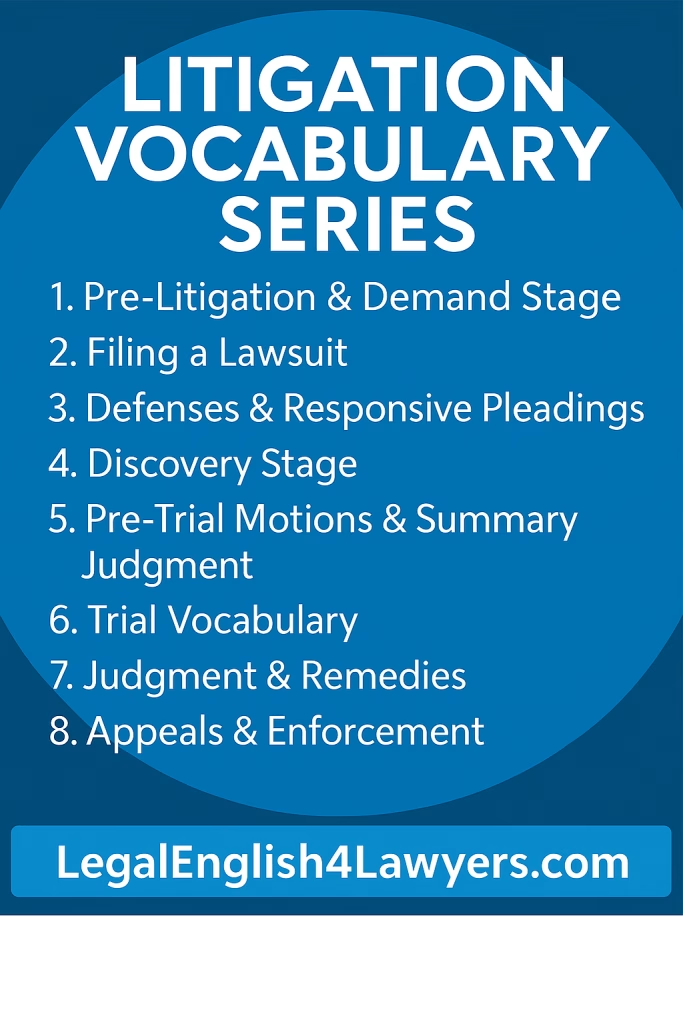
Introduction To The Discovery Phase.
The discovery phase is often the longest and most complex part of litigation. It is the stage where both parties exchange information, investigate facts, and gather evidence that will shape their legal strategies.
Mastery of the litigation vocabulary language used during discovery is critical—not only to comply with procedural rules but also to frame disputes, anticipate defenses, and build persuasive narratives.
This is Part 4 of our 8-part Litigation Vocabulary Series, designed to help lawyers and law students build fluency in Legal English across each phase of a lawsuit.
Pre-Litigation Stage -Litigation Vocabulary Series (Part 1),
Filing a Lawsuit – Litigation Vocabulary Series (Part 2)
Defenses & Responsive Pleadings -Litigation Vocabulary Series (Part 3)
Discovery Phase Litigation Vocabulary Terms
1. Discovery
Definition:
The formal process by which parties to a lawsuit obtain information, documents, and evidence from each other and from third parties.
Example:
The court set deadlines for written discovery and depositions to be completed before trial.
Legal Context:
Discovery ensures transparency and fairness by allowing both sides access to the facts necessary to prove or defend their claims. It includes various tools such as interrogatories, requests for production, requests for admission, and depositions, all bounded by the principles of relevance and proportionality.
- Relevance: The tendency of evidence to affect the probability of a fact being true.
- Proportionality: Ensuring discovery efforts are reasonable compared to the importance of the issues and the burden of producing information.
2. Interrogatories
Definition:
Written questions formally submitted by one party to another, requiring written answers under oath.
Example:
Plaintiff served interrogatories asking the defendant to identify all employees involved in the project.
Legal Context:
Interrogatories are used to obtain factual information, narrow issues, and identify witnesses or documents early in the litigation. Unlike depositions, which involve oral testimony, interrogatories allow considered, written responses that are made under penalty of perjury.
- Perjury: The criminal offense of lying under oath.
3. Requests for Production
Definition:
Formal demands for documents, electronically stored information (ESI), or tangible items relevant to the claims or defenses.
Example:
Defendant responded to a request for production by providing financial records from the past five years.
Legal Context:
Requests for production are essential to building the factual record of a case. Parties must produce materials within their possession, custody, or control. This obligation can extend to third parties if the responding party has legal access to the documents.
- Electronically Stored Information (ESI): Data or documents stored electronically, including emails, databases, and metadata.
- Possession, custody, or control: Having physical possession or the legal right to obtain the documents requested.
4. Depositions
Definition:
Out-of-court, oral questioning of a party or witness under oath, recorded for use during litigation.
Example:
Counsel took the deposition of the plaintiff’s expert witness regarding causation opinions.
Legal Context:
Depositions preserve testimony, allow for impeachment at trial, and test a witness’s credibility. A deponent (the person being questioned) must answer all non-privileged questions unless instructed otherwise by counsel. Depositions often involve objections to protect privileges without obstructing the discovery process.
- Deponent: The individual providing sworn oral testimony.
- Impeachment: Challenging the credibility or truthfulness of a witness’s testimony.
5. Requests for Admission
Definition:
Written statements asking the opposing party to admit or deny the truth of facts or the authenticity of documents.
Example:
Plaintiff served requests for admission asking Defendant to admit the existence of a signed agreement.
Legal Context:
Requests for admission narrow trial issues by confirming undisputed facts. Failure to respond within the allotted time usually results in automatic admission. These tools reduce litigation costs by limiting the number of matters that must be proven during trial.
- Authentication: Verifying that a document is genuine and what it purports to be.
6. Protective Order
Definition:
A court order limiting or restricting discovery to prevent undue burden, harassment, or the disclosure of sensitive information.
Example:
Defendant obtained a protective order restricting dissemination of confidential business records.
Legal Context:
Protective orders balance the right to discovery against the right to protect privacy, trade secrets, or privileged communications. Courts may order documents to be filed under seal, limit the scope of questioning, or bar certain disclosures altogether.
- Under seal: Filing documents privately with the court, unavailable to the public.
7. Privilege Log
Definition:
A list describing documents withheld from production on grounds of privilege without disclosing the protected information.
Example:
Defendant submitted a privilege log identifying emails withheld based on attorney-client privilege.
Legal Context:
When asserting privilege, a party must prepare a privilege log that provides enough detail to assess the claim without revealing privileged content. Common privileges include the attorney-client privilege and the work product doctrine.
- Attorney-client privilege: Protection of confidential communications between lawyer and client.
- Work product doctrine: Protection of materials prepared in anticipation of litigation.
8. Motion to Compel
Definition:
A request asking the court to order a party to respond fully to discovery requests.
Example:
Plaintiff filed a motion to compel production of internal audit reports.
Legal Context:
A motion to compel enforces discovery obligations when a party refuses or fails to produce requested information. Courts may impose sanctions for failure to comply after a motion is granted, ranging from monetary penalties to exclusion of evidence.
- Sanctions: Court-imposed penalties for violations of rules or orders.
Conclusion: Discovery Phase
Discovery is where litigation is truly built. It provides the facts, documents, and testimony that determine trial strategy and settlement value. Lawyers who master the language of discovery gain a critical advantage—communicating more persuasively with courts, clients, and opposing counsel alike. For non-native English speakers, fluency in discovery vocabulary is essential for active participation in complex litigation.
Our 8 Part Litigation Vocabulary Series
Litigation involves multiple stages, each with its own unique terminology. To help you master the vocabulary used at each stage, we’ve created detailed guides you can explore:
- Pre-Litigation Vocabulary: Investigating and Finding the Facts
- Filing a Lawsuit: Initiating Legal Action
- Defenses and Responsive Pleadings Vocabulary
- Discovery Phase Vocabulary: Evidence and Information Gathering
- Pre-Trial Motions and Summary Judgment Vocabulary
- Trial Stage Vocabulary: Presenting Your Case
- Judgment and Remedies Vocabulary
- Appeals and Enforcement Vocabulary
Each guide is designed to deepen your understanding of essential legal English at every critical point in the litigation process.
Build Your Legal English Skills with Confidence
Clear, confident communication is essential for every lawyer. Whether you’re working on conversations, meetings, or documents, strong Legal English helps you succeed. Book a free coaching session and start building skills you can use in any area of legal practice.
Disclaimer
The content provided herein is only for discussion purposes and may contain errors. The reader is responsible to confirm the accuracy of the information provided. The content does not constitute legal or professional advice. We disclaim any liability for any loss or damage incurred directly or indirectly from the use of this information.

